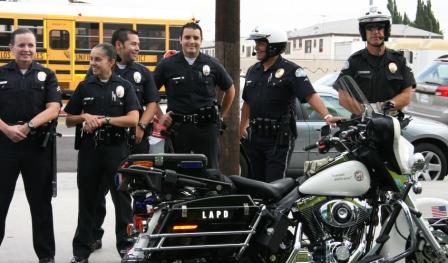This story originally appeared on iWatchnews.org by the Center for Public Integrity.
In the wake of critical news reports, Los Angeles school police and administrators have agreed to rethink enforcement tactics that have led to thousands of court citations yearly for young students in low-income, mostly minority neighborhoods.
 The Center for Public Integrity and the Los Angeles-based Labor-Community Strategy Center each performed their own analysis recently of previously unreleased citation records obtained from the Los Angeles Unified School District Police Department, the nation’s largest school police force. The Center found that between 2009 and the end of 2011, Los Angeles school police officers issued more than 33,500 tickets to students 18 and younger, with more than 40 percent handed out to kids 14 and 10 years old. That was an average of about 30 tickets a day. A large portion of the tickets for younger children were for disturbing the peace, which can include a physical fight or using threatening or disruptive language.
The Center for Public Integrity and the Los Angeles-based Labor-Community Strategy Center each performed their own analysis recently of previously unreleased citation records obtained from the Los Angeles Unified School District Police Department, the nation’s largest school police force. The Center found that between 2009 and the end of 2011, Los Angeles school police officers issued more than 33,500 tickets to students 18 and younger, with more than 40 percent handed out to kids 14 and 10 years old. That was an average of about 30 tickets a day. A large portion of the tickets for younger children were for disturbing the peace, which can include a physical fight or using threatening or disruptive language.
Some parents and concerned juvenile-justice judges have questioned whether it’s appropriate for such minor indiscretions to be handled by police, rather than school authorities.
Arguing that heavy police ticketing of children is counterproductive, Manuel Criollo of the Labor Community Strategy Center said his group has met twice with L.A. Unified School Police Chief Steven Zipperman and Michelle King, a deputy district superintendent. A third meeting is expected to take place this month.
Criollo said Zipperman was surprised at revelations that children as young as 7 and 8 have been given court summonses, many of which include monetary penalties. Police and administrators agreed to discuss alternatives to ticketing for tardiness, disturbing the peace and “possession” offenses, which can include possession of cigarettes, lighters or magic markers that could be used for graffiti, Criollo said.
A spokesperson for L.A. Unified said in a statement that “LASPD is committed to reviewing the data and analyzing incident types in which alternative strategies can be feasibly developed, especially in areas such as truancy.”
During the week of June 18, the spokesperson also said, Los Angeles school police, “collaborating with other district offices and divisions, will begin to develop a timeline for working on identifying alternative strategies . . . Considering we are the largest school district in the state and second largest in the country, developing this timeline will take time and diligence. “
The Center’s analysis also showed that citations to middle-school students were highly concentrated in Los Angeles’ most heavily Latino and African-American neighborhoods. Los Angeles public radio station KPCC created a mapand also produced a report on the citations in collaboration with the Center.
In response to revelations about the volume of citations, district officials and police had previously maintained that court appearances would help students learn that fighting and other unlawful behavior would not be tolerated as adults.
“I’m not hearing them saying that now,” Criollo said.
A growing number of educational experts contend that introducing students to the criminal-justice system for low-level offenses actually pushes many away from school and increases the possibility of their dropping out. The areas where student ticketing is heaviest corresponds to neighborhoods where Los Angeles’ dropout rates have been highest. Criollo and others who want reforms suggested that a heavier police presence in lower-income neighborhoods leads to unequal police involvement in school life.
After an investigation by the U.S. Department of Education’s Office for Civil Rights, the Los Angeles district agreed last year to take steps to reduce the district’s relatively high suspension rates of African-American students. As part of its review of Los Angeles’ ongoing reforms in discipline policy, the civil rights office is also reviewing the district’s history of court citations.
Criollo said it’s hard to tell from records released so far how many tickets originate with school administrators deciding to involve police in a school matter and how many are the result of officers’ own decisions to issue citations.
Photo by Office of the Mayor of Los Angeles





























